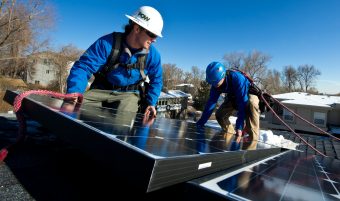
The prices of fossil fuels are not standing still yet on the world market, so the kilowatts obtained from them are very expensive. It is clear that for a stable future, we need renewable energy sources (RES) that will make the current energy crisis and excessive air pollution things of the past. In addition, RES brings young people the opportunity to be part of an ever-evolving industry, to constantly adopt new technologies and find secure, well-paid jobs. Therefore, our interlocutor is a young engineer Nikola Grubor, who found his job and a group of like-minded people in the CEEFOR company.
CEEFOR has been designing solar power plants for more than ten years and helping its clients reduce electricity consumption, and Grubor and his team are responsible for some of the largest solar power plants in our area. We talked to the young engineer about his journey into the world of green kilowatts and young people’s growing interest in entering this industry.
We also referred to the energy crisis, and Grubor spoke about the reasons why the industry is increasingly turning to solar energy, as well as the recently adopted Law on the Use of RES, which can bring energy stability and financial benefits to Serbian citizens.
EP: We are witnessing an increase in the price of conventional energy sources, and thus electricity worldwide. Can the citizens of Serbia prevent the energy crisis with the help of renewable energy sources?
Nikola Grubor: The large rise in electricity prices, caused by increased energy demand after the opening of large economies, then reduced production from wind farms in northern Europe, as well as problems with Russian gas, is a major blow to our industry. Although citizens did not feel the effects of the energy crisis, as the price of electricity has changed only for industry, the question is how sustainable the current situation is. After major accidents at TENT and the state’s inability to provide energy for its own needs, any additional installed capacity from renewable sources is a relief, both for the state that will import less energy and for consumers who will significantly reduce electricity bills at times when market prices are at an all-time high. I would like to mention that the energy transition should be approached responsibly, and we should not rush into the immediate shutdown of conventional power plants, as the consequences of irresponsible integration of renewable sources into the system could be incalculable.
EP: Last year was marked by the adoption of several laws in the field of mining and energy, one of which relates to the use of renewable energy sources. Can you tell us which novelties were introduced by this law and what they will bring to Serbia’s citizens?
Nikola Grubor: The long-awaited law passed at the end of March last year introduced a few innovations that are the basis for large investments in the development of solar power plants and wind farms, increasing the share of renewable energy sources in our system and reduce emissions. With the possibility of obtaining so-called market premiums through auctions (they are a supplement to the market price of electricity delivered to the market), the law allows citizens and companies to gain the status of buyer-producer (so-called prosumer) through a simplified procedure lasting a few months. The prosumer has the right to produce electricity for his consumption, but he can also deliver any surplus to the transmission or distribution system.
In focus:
EP: How many projects has your company implemented so far? Have factors such as the new Law on RES, higher electricity prices and the need to reduce greenhouse gas emissions contributed to the increase in workload?
Nikola Grubor: Although the increased volume of work was expected after adopting the new law, and the ensuing energy crisis hit everyone. The industry, which will not be able to keep up with such a rise in prices, is forced to turn to solutions such as solar power plants. Prior to the price increase, the projects were investments that were repaid within six to seven years, while now, it takes four to five years to return on investment. As for the projects of company, many of them have already been realized or are approaching their realization. Many projects (measured in tens of megawatts) are in preparation, which is a good indicator that large investors have recognized who is the true leader in the field of renewable sources.
EP: Being part of a growing industry, such as renewable energy, certainly carries a number of challenges. How often are employees required to learn and adopt new technologies?
Nikola Grubor: As mentioned, the challenges are numerous. Manufacturers of solar system components are improving their products every day to make the systems better and more efficient so that they can crystallize as leaders in their fields in the world. Although fundamentally similar, let’s compare projects from a few years ago with today’s. We can see significant differences, which is the best indicator of how vital everyday learning and adoption of new technologies is.
EP: Can you single out one or more projects that were specific and why were they different? How did you solve the challenges you encountered while working on it?
Nikola Grubor: Each project is specific and different from the previous one, whether it is a 50 kW or 10 MW power plant. Every step of the project, starting from the original idea, solution, the whole correspondence with the relevant institutions, and implementation represents a kind of challenge that is easily solved with a quality team of people that the company CEEFOR has.

EP: Which project (or projects) would you single out as the most important?
Nikola Grubor: At this moment, I would like to single out the solar power plant in Sremska Mitrovica with a capacity of 3 MWp*, which will be built on the roof of the building, as well as the power plant 8.4 MWp in Indjija, which will be the largest power plant built in our country.
EP: Why should young engineers enter this industry?
Nikola Grubor: There are several reasons. There is already a shortage of engineers who would meet the need for professional staff in this field (I would note that only hired five new engineers in 2021). With the development of electromobility and electricity storage technologies, the need for professional staff will even increase. In addition to working with new technologies, the realization that each project is a positive step towards reducing emissions and preserving the environment is only an additional motive for any individual willing to try in this industry.
Interviewed by: Milena Maglovski
Read the story in the new issue of the Energy portal Magazine ELECTROMOBILITY.



